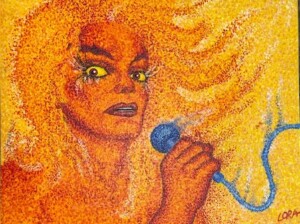
Yes, autism DOES come with superpowers. I can’t split the Red Sea, but I have exceptional abilities that are clearly the result of an autistic brain.
I didn’t get my Autism Spectrum Disorder diagnosis until middle age.
Several months after my diagnosis I saw a TV show, “Lucky Dog,” about finding forever homes for dogs.
The episode focused on Earl, a Pomeranian mix, who was paired with a retired couple and their autistic son.
Their son displayed stereotypical autistic features: openly stimming and avoiding any eye contact with Earl’s handlers.
This is the presentation of autism that I had always thought was actual autism, which was why I (who had always given strong eye contact and suppressed my “fidgeting” around other people) never considered that my awkward social experiences and peculiar thinking processes could be caused by autism.
Well, long story short, I underwent an assessment in middle age and was diagnosed with ASD.
My ASD Superpowers (no particular order)
#1. Highly Resistant to Peer Pressure. Even at age 13 and a freshman in high school, I just couldn’t understand why any girl would want to take up smoking. I could smell it on them.
I knew they did it because they didn’t have the guts to refuse it, or, they thought it was cool, which I thought was absolutely ridiculous. Again, I was 13 when I thought this way.
You couldn’t have gotten me to take a puff on a cigarette if I were told the reward would be sitting with the popular girls at lunch (I ate in the bathroom stall).
In college there was drinking all around me. It was as easy as 2 + 2 to decline offers of liquor. I couldn’t understand why kids found it so difficult to JUST SAY NO.
Resistance to peer pressure also includes easy defiance of whatever the latest trend in pop culture is.
I’ve never jumped on bandwagons, followed the crowd or suffered from a herd mentality.
I don’t get caught up in the “latest thing” just because it’s the latest thing. I still wear a fanny pack. I don’t care how out of style they are.
In middle age, I wear a big badass ponytail. If you think my leggings are too “loud” for a middle age woman…too bad; I’m still wearing them.
#2. Superior Pattern Recognition. In either ninth or tenth grade I took a standardized national test of various cognitive abilities including “abstract reasoning.”
The abstract reasoning portion of the day-long exam consisted entirely of determining which design came next in a progressing sequence. I scored a 97 percentile.
The same type of test was part of my autism assessment; scored a 95 (would’ve been higher had the examiner not been sitting right across from me watching!).
This ability doesn’t stay confined to a test. The ability to spot the pattern has massive carryover to many lines of work, including entrepreneurship (I’m a very successful content creator).
It undoubtly carries over in ways we don’t readily perceive – kind of like a brilliant computer program working in the background, affecting day-to-day operations in a very positive way.
#3. Deep, Complex Thinking and Superior Research Skills. I’ll admit, I can’t sit for four hours straight studying train schedules, canal configurations, drain pipe blueprints or memorizing the scientific names of every houseplant.
But I can certainly employ deep, complex thinking for lengthy periods related to my content creation business, which includes in-depth research of medical conditions.
If I wasn’t so fixated on avoiding the “sitting disease,” perhaps I could conduct this research for four uninterrupted hours.
But my knowledge of the sitting disease and blood clots forces me out of my chair every hour or so.
Whenever I need to find information online about a symptom or medical condition, particularly one that I’ve had personal experience with, I amass the information rapidly and retain it.
I google at warp speed and use every key-phrase permutation possible, knowing where to take deep dives to unearth all the possible information.
I’m 100 percent sure that if a neurotypical were tasked with the same assignment, I would gather significantly more information in half the time – and know it without taking notes.
#4. Extreme Attention to Detail. From time to time my mother has pointed out that I had a “good eye for detail” when she needed a second pair of eyes for something.
I notice or pick up on things that others miss. Of course, these aren’t subtle social cues.
While a neurotypical’s brain will be honed in on detection of trace social cues and nuanced body language, my autistic brain will notice many things that will get by those neurotypicals.
After my mother underwent quintuple bypass surgery, I discovered seven short-sights committed by medical staff.
My autistic brain just notices too many things sometimes, and this came in handy during the days immediately following the surgery.
This included noticing that the dietary delivery included a big bottle of water that exceeded the amount that my mother was supposed to have daily, due to kidney damage from the surgery.
And why did I, and apparently no nurses, notice that her left arm was bigger than her right?
Suspecting a blood clot, I mentioned this; an ultrasound was ordered. Prior to the procedure, I peeked over the sonographer’s shoulder to view the order form in her hand; it said for the right arm! I pointed this out. Diagnosis: blood clot in her left neck.
#5. Creative Problem Solving Skills. Research shows that autistic people are good at thinking of clever ways to use an object that are completely unrelated to its intended use. We think outside the box.
After my mother came home from quintuple bypass surgery, she had to take a lot of medications. On the kitchen table were a bunch of pill bottles.
I wanted to keep them there, in plain easy sight, as I was in charge. However, being on the kitchen counter meant that the little orange bottles would easily get knocked over, roll about and end up scattered and disorganized.
I wanted them in a nice line – and to stay put. A shoebox wouldn’t work because they could get knocked over.
In fact the shoebox itself could get slid around. Within 45 seconds of pondering how to contain those pill bottles, the solution appeared in my head: my father’s construction level!
The pill bottles fit snuggly between the bars of the level which formed a straight line; they couldn’t slide around, yet could be easily removed.
The metal level had enough weight that it couldn’t get accidentally pushed or slid around on the countertop; it sat stubbornly in place. I could remove a bottle without disturbing the level’s position. Eureka!
#6. Facts Over Feelings. I follow logic, not emotions. I tend to make decisions based on current facts rather than past events.
I recognize that a past event won’t necessarily predict the outcome of a current choice.
For example, when driving from Chicago to Cleveland many years ago, I accidentally ran over a muffler.
It punctured my gas tank, stranding me. I had to wait two hours for a tow truck.
However, the event occurred early into the trip. My car was towed to a shop that quickly replaced the muffler, and I drove home.
As an autistic person, this major unexpected change in a big plan should have really rattled me.
However, the Mr. Spock component of my autism took over. I decided to go to bed very early, then hit the road at 3:00 AM, knowing that the odds of getting another gas tank puncture were just as low as they had been prior to the actual puncture.
Thus, I had no worry of getting a puncture, and made it to my parents’ home at 11:30 am!
#7. Treating Crises As a Business Transaction. I’ve been in situations that would have made women scream, shriek or panic.
One day a small snake fell onto my hand from above as I was unlocking the outside door to the common storage room of my townhome complex. I didn’t flinch.
One day in Chicago during a very high windstorm, a scrap of metal hurled my way. I reflexively dodged it, keeping my cool.
When three doctors told me (and no other family members were present) that if my mother didn’t have the quintuple bypass surgery, she’d probably have a fatal heart attack within one week, I remained calm and collected – asking medical questions – though I was visibly tremoring. There were no hysterics, sobbing or “falling apart.”
In the face of crisis, I’m tactical rather than emotional.
One night I was driving through a supermarket parking lot when I thought I had run someone over.
I had caught a blur in my peripheral vision, then my car hit something.
I stopped, removed the keys from the ignition, held them in my hand and calmly stepped out, expecting to see a crumpled body in front of my car.
Instead, on the passenger side was a man on his knees, being held by two security personnel.
I instantly figured out the situation: He’d been fleeing from the guards, running fast, looking behind himself, not seeing my car, and ran smack into the side of my car.
With a matter-of-fact demeanor, I asked if they needed me as a witness; they said they had it under control.
I casually got into my car and drove off.
There’ve been many more unnerving situations during which I was in “Vulcan mode” while others were shaken up or frightened.
#8. I Don’t Leave People Guessing. I’m straightforward and don’t play mind games. People don’t have to wonder what I’m feeling. They know because I’m clear about it.
#9. Fascination with So Many Things. Though I don’t have encyclopedic knowledge of any subject, I know a heck of a lot about a lot of things.
That’s because a lot of things interest me and have intrigued me in the past, and I wanted to learn a lot about them.
You may have read that autistic people have “limited” interests or only one or two interests that they go to town with.
But many autistic people have numerous interests spanning many years, and accumulate a vast amount of knowledge.
I assure you, I know more about obstructive sleep apnea than my niece who has a medical degree.
#10. Multiple Miscellaneous. It’s a known fact that autistic people have excellent long-term memories.
I have exceptional recall of events that occurred when I was five, six and seven, not to mention older grade school age, while my neurotypical sister claims to have virtually no memory of her childhood.
I’m a synesthete. Synesthesia means experiencing more than one sense at a time.
This is so cool! I hear color – particularly with letters, words, names, numbers and symphonic music. I see music, particularly symphonic, as shapes.
In one study, synesthesia was found in 18.9% of autistics and only in 7.22% of the control group.
I began drawing at age five and became quite prolific at illustration. Though NTs can also be gifted at illustration, I believe in my case this was driven by autism.

Painting by the author, Lorra Garrick, circa 1984
Autism Comes with Superpowers
Marleen Lam, 48, was diagnosed with ASD at 38.
She says the following are her autistic superpowers: “Creativity, and big-hearted sentiments for the misunderstood, underdogs and underrepresented sectors of society.”
Autism is a neurotype, not a mental illness or some kind of “disease” that needs to be fixed.
Unfortunately, we live in a world where conformity is king.

 Marleen Lam
Marleen Lam







































